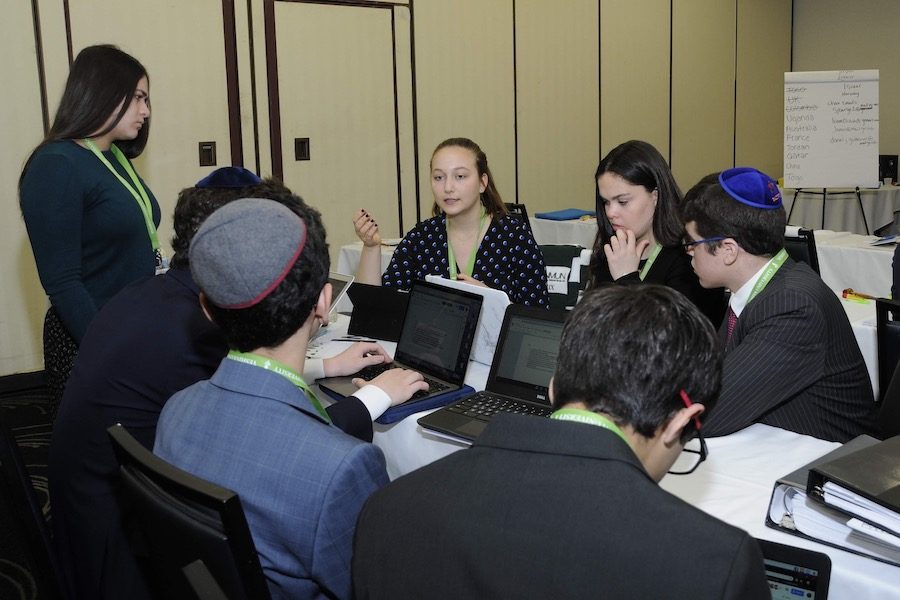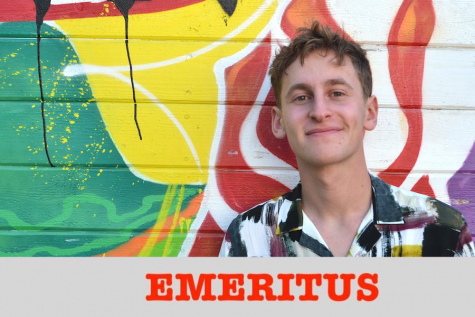YUNMUN brings home first awards since team’s revival
RECOGNITION: Captian Ari Sassover, representing the UK in the U.N. Human Rights Council, won an honorable mention award. Photo Courtesy of Yeshiva University
March 13, 2019
For the first time since 2011, Shalhevet took home prizes from Yeshiva University’s annual Model United Nations debate tournament (YUNMUN), held February 10-12 at YU in New York.
After ending a 10-year streak of winning awards there in 2012, in 2013 the team stopped attending the meet, where this year 420 students from 49 Jewish high schools represent countries in committees corresponding to those in the actual United Nations.
In 2016 then-sophomores Clara Sandler and Ariella Sassover revived the team.
“There are now two very legitimate debate teams at Shalhevet — we just wanted to be legitimate,” said Clara, now a senior and this year’s co-captain. “Because we won the awards, because we made our presence known both in the Yeshiva League world and at Shalhevet, people respect us.”
They won no awards at the 2017 and 2018 conferences, but this year, Ari and Honor Fuchs, who became co-captain last year, each won honorable mention.
Nine of Shalhevet’s 11 delegates represented the United Kingdom (Great Britain and Northern Ireland) while two represented Guatemala.
“Every year when we leave the conference, I think about how much our team has grown that year,” said Ari, who represented the U.K. in the U.N. Human Rights Council.
“It’s been amazing to watch us all grow, because there’s such a clear distinction between how we were the year before and how we are now.”
Honor, who represented the U.K. in the tournament’s model U.N. Educational, Scientific and Cultural Organization (UNESCO), said that paying attention to world events was key to the team’s success and pointed to various examples\including the Syrian refugee crisis and the Rohingya genocide in Myanmar.
“I think it’s important now more than ever to be educated about what’s going on in the world,” said Honor. “Model U.N students always know everything about what’s happening in the world.”
History Department chair Dr. Keith Harris, the team’s faculty advisor for the past two years, pointed to the skills the team learned from past conferences.
“I’ve seen them learn from their experience and come back with strategies and I think that it’s the way to go,” said Dr. Harris. “Being in the room and seeing how everything unfolds and how the committees work and the procedure, when they learn all that stuff, they come back and strategize the best way to do the best that they could. And that really is what paid off.”
Unlike Model Congress tournaments where Shalhevet competes, to which it can send as many delegates as it wants, for YUNMUN Yeshiva University decides on a certain number of total delegates and allots schools different numbers of delegates according to a formula. The formula includes the school’s size and also the number of its alumni attending YU.
This year and last, Shalhevet has sent 11 delegates to this year’s conference and the year before — three more than in 2012, when then-advisor Mr. Christopher Buckley team size was a reason for their not having won.
“Because the committee sizes are much larger, the probability of winning is smaller,” said Mr. Buckley in a Boiling Point interview at the time.
In an email to Mr. Buckley that year, YU spokesperson Marc Zharnest said that “a delegation size is based on current students at YU and past performance at the conference.”
Honor says that three years after returning from its four-year break, Shalhevet’s team has reestablished a presence at the conference.
“I’m really excited for the future of Model U.N,” said Honor. “We’ve made our presence known at YU. We’re now recognized as good debaters and next year people are going to ask ‘is there a Shalhevet High School kid in your committee?’”
Dr. Harris said he would like the team to get more practice locally, but most conferences where they could compete against local schools take place over Shabbat. He said he hoped Shalhevet could host a Model U.N conference for Jewish schools some day.
Get the latest from The Boiling Point. Sign up for our news feed.














